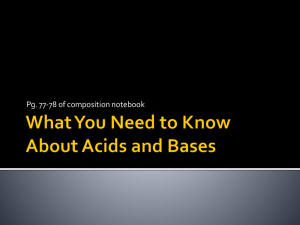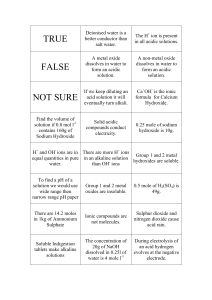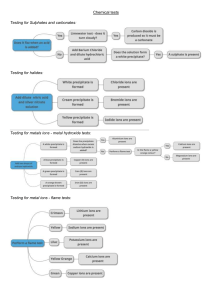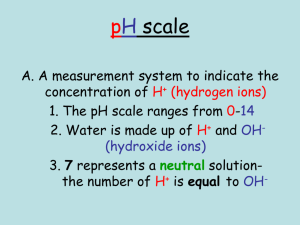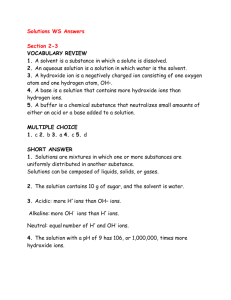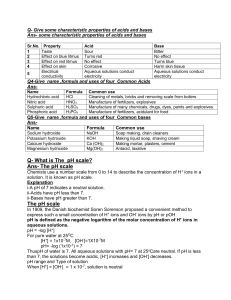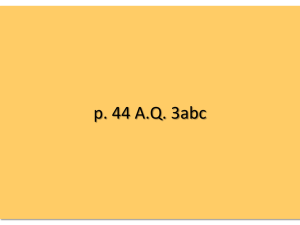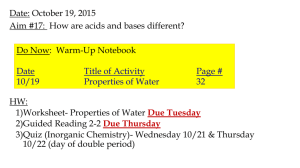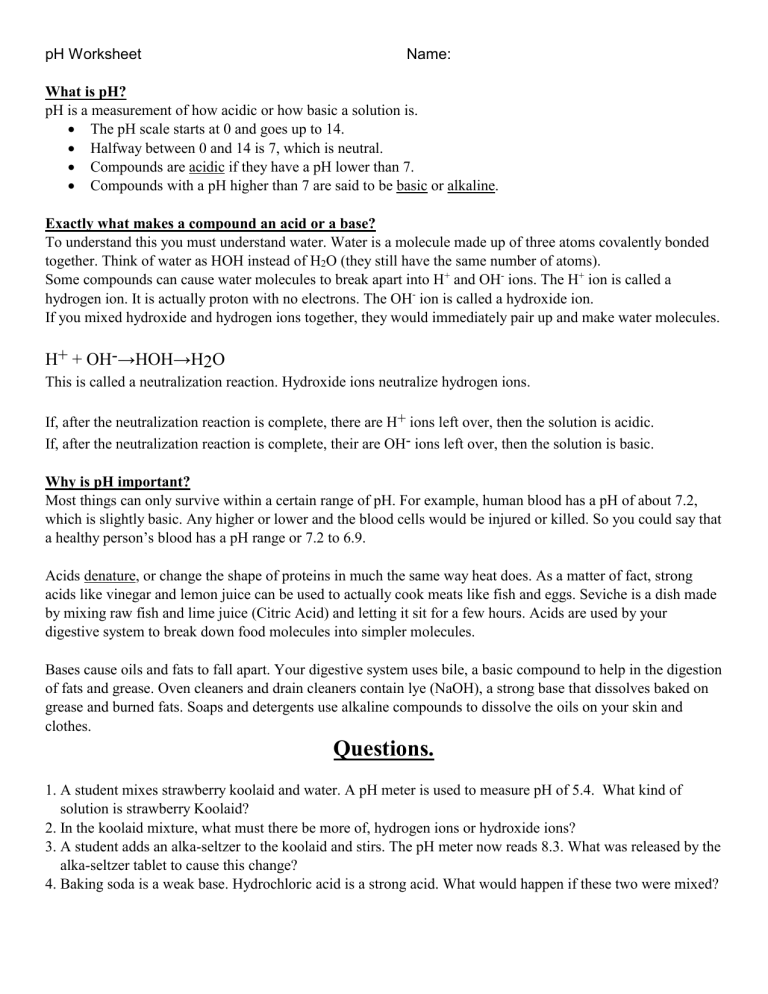
pH Worksheet Name: What is pH? pH is a measurement of how acidic or how basic a solution is. The pH scale starts at 0 and goes up to 14. Halfway between 0 and 14 is 7, which is neutral. Compounds are acidic if they have a pH lower than 7. Compounds with a pH higher than 7 are said to be basic or alkaline. Exactly what makes a compound an acid or a base? To understand this you must understand water. Water is a molecule made up of three atoms covalently bonded together. Think of water as HOH instead of H2O (they still have the same number of atoms). Some compounds can cause water molecules to break apart into H+ and OH- ions. The H+ ion is called a hydrogen ion. It is actually proton with no electrons. The OH- ion is called a hydroxide ion. If you mixed hydroxide and hydrogen ions together, they would immediately pair up and make water molecules. H+ + OH-→HOH→H2O This is called a neutralization reaction. Hydroxide ions neutralize hydrogen ions. If, after the neutralization reaction is complete, there are H+ ions left over, then the solution is acidic. If, after the neutralization reaction is complete, their are OH- ions left over, then the solution is basic. Why is pH important? Most things can only survive within a certain range of pH. For example, human blood has a pH of about 7.2, which is slightly basic. Any higher or lower and the blood cells would be injured or killed. So you could say that a healthy person’s blood has a pH range or 7.2 to 6.9. Acids denature, or change the shape of proteins in much the same way heat does. As a matter of fact, strong acids like vinegar and lemon juice can be used to actually cook meats like fish and eggs. Seviche is a dish made by mixing raw fish and lime juice (Citric Acid) and letting it sit for a few hours. Acids are used by your digestive system to break down food molecules into simpler molecules. Bases cause oils and fats to fall apart. Your digestive system uses bile, a basic compound to help in the digestion of fats and grease. Oven cleaners and drain cleaners contain lye (NaOH), a strong base that dissolves baked on grease and burned fats. Soaps and detergents use alkaline compounds to dissolve the oils on your skin and clothes. Questions. 1. A student mixes strawberry koolaid and water. A pH meter is used to measure pH of 5.4. What kind of solution is strawberry Koolaid? 2. In the koolaid mixture, what must there be more of, hydrogen ions or hydroxide ions? 3. A student adds an alka-seltzer to the koolaid and stirs. The pH meter now reads 8.3. What was released by the alka-seltzer tablet to cause this change? 4. Baking soda is a weak base. Hydrochloric acid is a strong acid. What would happen if these two were mixed? 5. A student takes large glass of tap water and measures the pH after these things are done to the water: Substances Changes? pH (DATA) Water directly out of tap NONE (CONTROL) pH =7.2 Water after exhaled air is blown through a straw into it for 5 minutes. pH=5.1 Water after a snail has lived in it for three days pH=5.8 Water with 2mL of bleach added pH=9.4 Water with instant coffee added pH=5.0 Water after an aquatic plant is grown in it for three days in bright sunlight pH=7.7 Water with lemon juice added pH=3.4 Bromthymol Blue Color (PREDICTION) Litmus Paper Change (PREDICTION) Bromthymol blue is a chemical indicator that is blue in basic and neutral solutions, and turns greenish and then yellow as the solution becomes more and more acidic. Fill in what color you think bromthymol blue would be in each of the situations in the chart. Litmus paper is an indicator containing a compound from a lichen. Blue Litmus Paper turns red under acidic conditions and Red Litmus Paper turns blue under alkaline conditions. What effect does carbon dioxide have on tap water? Is bleach an acid or a base? Is coffee an acid or a base? What did the aquatic plant release into the water? What effect did the substance the aquatic plant excreted have on the water? How do you think stains are removed by a solution of water, detergent, and bleach?
